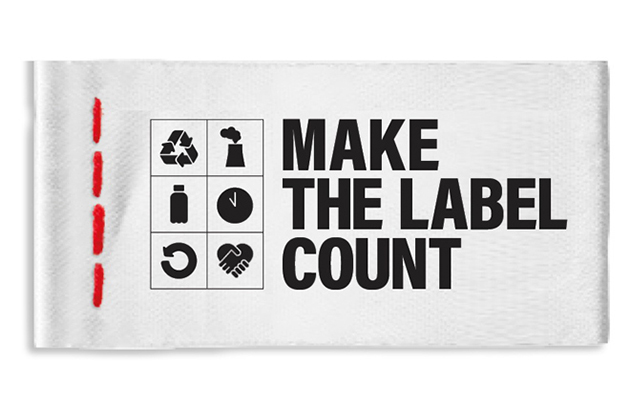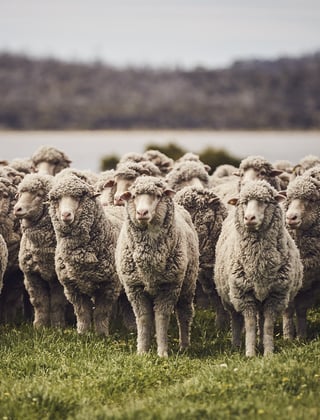PEF omitted from EU proposal, for now

In good news for the wool industry, references to the incomplete Product Environmental Footprint (PEF) methodology have been omitted from the European Commission’s newly released proposal to stop misleading green claims by companies.
The Make the Label Count campaign mark incorporates symbols which reference the main concerns being raised with policy makers, clockwise from top left: (1) Renewability and biodegradability, (2) Equitable comparison of fibres, (3) Duration of service, (4) Social impacts, (5) Production practices, (6) Accounting for microplastics.
In good news for the wool industry, references to the incomplete Product Environmental Footprint (PEF) methodology have been omitted from the European Commission’s newly released proposal to stop misleading green claims by companies.
On 22 March, the European Commission (EC) published its proposal for a Green Claims Directive which contains its plans to protect consumers in the European Union from greenwashing.
The proposed new rules are aimed at stopping companies from making misleading claims about the environmental merits of their products and services and allow consumers to make informed environmental choices.
In a win for wool and other natural fibres, the EC decided against directing companies to substantiate their green claims using the Product Environmental Footprint (PEF) methodology – an incomplete tool that disadvantages natural fibres when measuring impacts of apparel and footwear. The proposal states that environmental claims should “rely on recognised scientific evidence and state of the art technical knowledge”.
PEF and the Make the Label Count campaign
The PEF is a project that the EC has been working on for a number of years. Its aim was to introduce environmental labelling on apparel products for sale in the European Union. Whilst the intent is laudable, the PEF methodology, counterintuitively, scores apparel and footwear products made from wool and other natural fibres poorly compared to synthetic fibre products.
This is because the PEF methodology is narrowly drawn and fails to adequately take account of key sustainability considerations for the fashion industry, such as the benefits of using natural, renewable and biodegradable raw materials. Based on life-cycle assessment (LCA) principles, PEF does not account for the formation of the oil and natural gas from which fossil fuel fibres are made, whereas all the impacts of forming natural fibres are accounted for in PEF – resulting in an inequitable comparison. As such, the PEF risks misleading consumers about the impacts of their apparel and footwear products, and ultimately undermines the EC’s sustainability objectives.
In response to the development of the PEF, AWI in 2021 joined with international natural fibre organisations and environmental NGOs to launch the campaign called Make the Label Count to try to ensure consumers receive credible information and prevent the introduction of inaccurate and poor environmental scores for natural fibres such as wool on clothing labels across the EU.
New proposal welcomed

Make The Label Count campaign spokesperson and Secretary General of the International Wool Textile Organisation, Dalena White.
The Make the Label Count campaign welcomes the European Commission’s new proposal for a Green Claims Directive.
“The Make the Label Count campaign is pleased to see that what we’ve been advocating for has come to fruition – references to the PEF method have been removed from the Commission’s proposal, with only a methodology based on scientific evidence serving as sufficient criteria,” said campaign spokesperson and Secretary General of the International Wool Textile Organisation, Dalena White.
“The European Commission has clearly recognised the shortcomings of the PEF methodology and the need for further improvement prior to adoption.”
The EC is seeking feedback on its proposal for a Green Claims Directive until 22 June. The proposal will then enter a long process where it’s debated by all 27 Member States of the European Union and the European Parliament before it takes its final form.
“Further clarity is needed on several aspects of the proposal. We’ll continue advocating to ensure the PEF is not inserted back into the final law, until it is made fit for purpose. The directive will likely not enter into force until mid- or end of 2024 after which Member States would have two years to transpose the Directive into national law,” Dalena said.
“We remain committed to working with lawmakers to ensure the final text is consistent with the European Union’s environmental objectives and the transition to a circular economy. Make the Label Count urges policy makers to be ambitious and act quickly in adopting the proposal.”
AWI has undertaken and continues to undertake a range of scientific research to support the wool industry’s environmental claims, which not only assists the Make the Label Count campaign but also helps AWI’s marketing arm The Woolmark Company to promote the eco-credentials of Australian wool.
More information: www.makethelabelcount.org
This article appeared in the June 2023 edition of AWI’s Beyond the Bale magazine. Reproduction of the article is encouraged.














